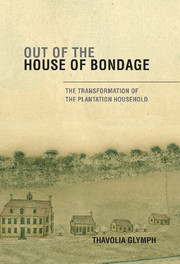Book contents
- Frontmatter
- Contents
- Acknowledgments
- Abbreviations
- Introduction
- 1 The Gender of Violence
- 2 “Beyond the Limits of Decency”
- 3 Making “Better Girls”
- 4 “Nothing but Deception in Them”
- 5 Out of the House of Bondage
- 6 “A Makeshift Kind of Life”
- 7 “Wild Notions of Right and Wrong”
- Epilogue
- Bibliography
- Index
- References
Epilogue
Published online by Cambridge University Press: 05 June 2012
- Frontmatter
- Contents
- Acknowledgments
- Abbreviations
- Introduction
- 1 The Gender of Violence
- 2 “Beyond the Limits of Decency”
- 3 Making “Better Girls”
- 4 “Nothing but Deception in Them”
- 5 Out of the House of Bondage
- 6 “A Makeshift Kind of Life”
- 7 “Wild Notions of Right and Wrong”
- Epilogue
- Bibliography
- Index
- References
Summary
I would stand for hours on the doorsteps of neighbors' houses listening to their talk, learning how a white woman had slapped a black woman, how a white man had killed a black man.
Richard Wright, Black BoyPlantation mistresses were slaveholders. They were slaveholders whether they held slaves in their own names or not, and this status gave them virtually unrestricted power over the slaves who labored in their homes. Black women who labored in the antebellum plantation household were enslaved workers. They were enslaved workers despite the intimacies inherent in the household. The plantation household was a site of work during and after slavery, and it was that despite the ideologies of white male patriarchy, white female subordination, and private versus public spheres, that circulated within and around its precincts. These are the simple facts that lie submerged in the historiography. Submerged along with them is the story of what those simple facts meant for the lives of black and white women in slavery and freedom. Yet this history is far from simple.
Over the past three decades, historians have worked imaginatively to re-interrogate a host of political and social conventions whose impact was to deny black people active roles in the making and remaking of slavery, emancipation, and the postemancipation world. The reward has been a more sophisticated understanding of the dynamics that this entailed.
- Type
- Chapter
- Information
- Out of the House of BondageThe Transformation of the Plantation Household, pp. 227 - 236Publisher: Cambridge University PressPrint publication year: 2003

